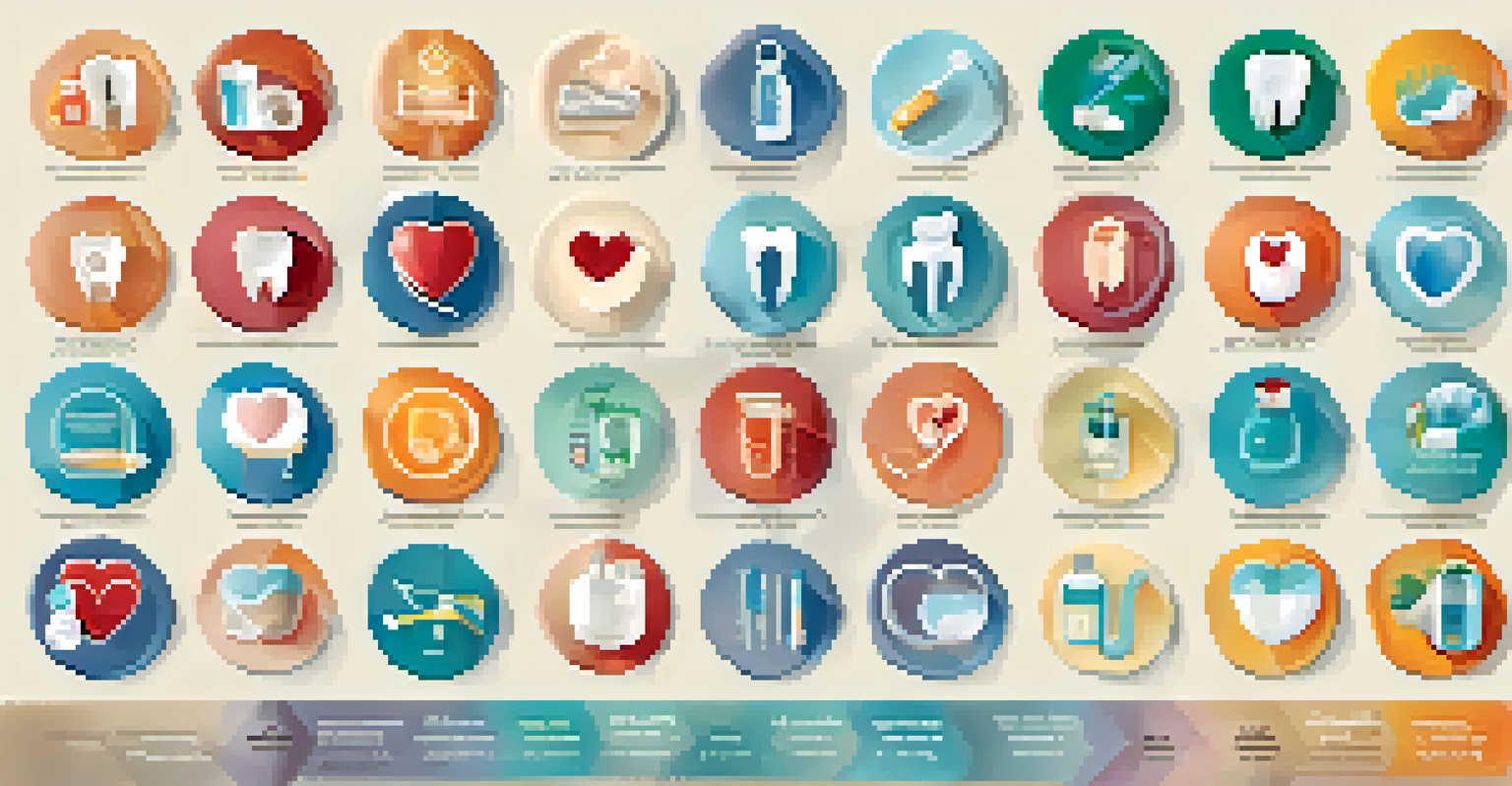Oral Health Education as a Tool for Better Health Outcomes

Understanding the Importance of Oral Health Education
Oral health education is crucial for promoting good dental hygiene and overall health. It helps individuals understand the connection between oral health and systemic diseases, emphasizing that neglecting dental care can lead to serious health issues. By educating people about proper oral care practices, we can empower them to take charge of their health.
Oral health is a window to your overall health.
When individuals are well-informed, they are more likely to adopt healthy habits such as regular brushing and flossing. Education also dispels common myths about dental care, making it easier for people to make informed choices. This knowledge can significantly reduce the incidence of dental problems over time.
Moreover, oral health education is not just for adults; it plays a critical role in children's development. By teaching kids about the importance of oral hygiene from an early age, we can instill lifelong habits that prevent cavities and gum disease, ultimately leading to healthier adults.
The Role of Schools in Promoting Oral Health Education
Schools are a prime setting for delivering oral health education, as they reach a large audience of children and their families. Implementing programs that focus on dental hygiene can create a culture of health within educational environments. This approach not only benefits students but also extends to their families, fostering community awareness.

By incorporating oral health education into the curriculum, teachers can provide children with practical knowledge about caring for their teeth. Fun activities like interactive games or dental health projects make learning engaging and memorable. This hands-on approach can significantly impact students' attitudes toward oral health.
Oral Health Education Empowers People
Educating individuals about oral health promotes better hygiene practices and reduces the risk of systemic diseases.
Additionally, partnerships with local dental professionals can enhance these educational efforts. Dentists can offer workshops or free screenings, reinforcing the importance of regular dental check-ups. Together, schools and dental professionals can create a supportive network that prioritizes oral health.
Community Programs: Expanding Access to Oral Health Education
Community programs play an essential role in expanding access to oral health education, particularly in underserved areas. These initiatives can provide valuable resources, such as free workshops and dental screenings, making oral health knowledge accessible to everyone. By breaking down barriers, we can empower individuals to prioritize their oral health.
An ounce of prevention is worth a pound of cure.
Outreach programs often target specific populations, including low-income families and seniors, who may face unique challenges regarding dental care. By tailoring educational content to meet the needs of these groups, we can ensure that the information is relevant and actionable. This personalized approach fosters trust and encourages individuals to engage with their oral health.
Moreover, community health workers can serve as vital links between healthcare providers and the public. They can share knowledge, dispel myths about dental care, and motivate individuals to adopt healthier habits. This grassroots approach can lead to significant improvements in overall health outcomes within the community.
The Impact of Oral Health on Overall Health Outcomes
Oral health is intrinsically linked to overall health, influencing various aspects of well-being. Poor dental hygiene can lead to conditions like heart disease and diabetes, demonstrating the importance of a holistic approach to health education. By addressing oral health, we can improve health outcomes across multiple domains.
Research shows that individuals with good oral health tend to have better nutritional habits, as dental issues can affect one's ability to eat and enjoy food. Consequently, promoting oral hygiene can lead to healthier dietary choices, impacting weight management and overall wellness. This connection underlines the need for comprehensive health education that includes oral care.
Schools Foster Oral Health Awareness
Integrating oral health education in schools creates a culture of health that benefits both students and their families.
Furthermore, mental health can also be affected by oral health. Issues such as tooth decay or gum disease can lead to pain and discomfort, impacting self-esteem and social interactions. By prioritizing oral health education, we can help individuals maintain both their physical and mental well-being.
Innovative Approaches to Oral Health Education
Innovative approaches to oral health education are emerging, leveraging technology to engage audiences effectively. Online platforms, mobile apps, and social media can be harnessed to spread awareness and provide information in a more accessible format. These tools allow for interactive learning experiences that cater to different learning styles.
For instance, gamification—the incorporation of game elements into learning—can make oral health education fun and engaging for children. By turning lessons into challenges or quizzes, kids are more likely to retain information about dental care. This modern approach resonates particularly well with younger audiences who are tech-savvy.
Videos and podcasts are also excellent mediums for delivering oral health messages. They can reach a wide audience and provide valuable tips and insights from dental professionals. By utilizing diverse formats, we can ensure that oral health education is engaging and relevant in today's digital age.
Barriers to Effective Oral Health Education
Despite its importance, several barriers hinder effective oral health education. One major challenge is the lack of resources, particularly in low-income communities. Limited access to dental care and educational materials can create disparities in oral health knowledge and practices.
Cultural beliefs and misconceptions surrounding dental care can also pose obstacles. In some communities, there may be a stigma associated with seeking dental treatment, leading to delayed care and worsening health outcomes. Addressing these cultural factors through tailored education is essential for promoting positive change.
Community Programs Enhance Access
Community initiatives help bridge gaps in oral health education, particularly for underserved populations.
Additionally, the fast pace of life can make it difficult for individuals to prioritize oral health education. Busy schedules often push dental care to the backburner, despite its critical role in overall health. By creating flexible learning opportunities, we can help individuals integrate oral health education into their daily lives.
The Future of Oral Health Education
The future of oral health education looks promising, with a growing emphasis on preventive care and community involvement. As awareness of the importance of oral health continues to rise, more initiatives will likely emerge to address the gaps in education. This shift towards prevention can lead to better health outcomes for all.
Collaboration between healthcare providers, educators, and community organizations will be key in driving this change. By working together, we can develop comprehensive programs that tackle oral health from multiple angles. This united approach can amplify the impact of educational efforts and foster a culture of health.

Ultimately, the goal is to create a society where everyone understands the significance of oral health. As education evolves and adapts to the needs of diverse populations, we can look forward to a healthier future for individuals and communities alike.